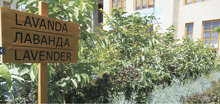The Mehrigiyo company was created in 1992 in the form of a small enterprise. A team of doctors, herbalists, and traditional healers joined forces and, as time and experience have shown, were able to synthesize the achievements of modern pharmaceuticals and ancient oriental medicine, as a result of which, in a fairly short period of time, they won the trust of consumers both in Uzbekistan and abroad.
The main activity of the company is the production of medicinal teas from medicinal plants. In order to achieve high quality and efficiency of products, not only harvesting and packaging of plants were mastered, but also cultivation on their own plantations and selection and sorting of plants according to the necessary parameters. An important detail of the preparation is sorting the plant into the necessary parts, dividing it into cuttings, stems, leaves, buds, inflorescences and seeds. In addition, to make tea, the formulation requires varying degrees of grinding, cold or heat treatment and aging. The company's professionals are responsible for this process, exercising control over each stage of production.
The company is proud of its geographical location - the fertile soil of the Ferghana Valley, surrounded by the Tien Shan, irrigated by the silty Syrdarya River and the highly mineralized Aksu mountain river, 300 sunny days a year, clean air, unexpected combinations of soils - from sandstone and salt marsh to foothill hills and yellow earth, as well as the climate, sultry steppe in the west and cool humid in the southeast. This is what contributes to obtaining high-quality saturated raw materials for production. Such popular plants as valerian, chamomile, lemon balm, milk thistle, nettle, yarrow are grown on the plantations of the enterprise, papaya trees, olive trees have been introduced and mastered, on the basis of which medicinal teas used for the prevention of diseases of the gastrointestinal tract, anemia, immune boosting, blood cleansing, medicinal teas are made.
The company's products are in great demand in the domestic and foreign markets. Currently, the enterprise produces more than 30 types of tea from medicinal herbs, green and black tea “Mujiza” (“Miracle”), “Papaya” tea, honey with “Papaya” additives, as well as a number of extracts, oils and extracts from stone fruits and other plants .
In 2005-2006, the enterprise took pride of place at the republican competition "Tashabbus", and in 2007 won in the nomination "Environmentally friendly technology". 2010-2012 at the International Food Exhibition World Food Uzbekistan for tea “Muzhiza” and “Papaya” (black, green), “Honey with Papaya additives” received a medal and diploma “Master of Quality”.
The company uses modern equipment to clean, sort and package tea; tea is packaged in disposable filter bags. Currently, the company plans to establish a constant export of products “Papaya tea”, “Mujiza tea”, “Honey with Papaya additives” to foreign countries and the CIS countries.
Agro tourism
Rural tourism (or agro tourism) is a type of tourism that involves temporary stay of tourists in rural areas for the purpose of recreation and/or participation in agricultural work; a sector of the tourism industry focused on the use of natural, cultural, historical and other resources of rural areas and its specifics to create a comprehensive tourist product.
Mandatory condition: tourist accommodation facilities, individual or specialized, must be located in rural areas or small cities without industrial and multi-storey buildings.
First of all, rural tourism is expected to provide calmness and regularity of rural life, clean air, silence and natural products, comfortable living conditions, home atmosphere, reasonable prices, a sense of closeness to nature, getting new impressions, getting acquainted with local traditions, opportunities for entertainment for children and leisure for adults.
Initially, rural tourism in Russia arose as a result of the development of the hotel industry in large resort areas (seaside resorts of the Black and Azov seas, sanatorium centers).
At present, due to the changed economic situation in the agricultural sector, characterized by increased mechanization and automation of agricultural production and a decrease in the number of people engaged in the production of agricultural products, the question of finding new types of activities that would replace or Supplement agricultural activities has become acute.
The development of agro tourism in the territories perfectly solves this problem, since it is the tourist component that can become a "catalyst" for the economic growth of the village. There are several explanations for this.
First, tourist activity is attractive with small initial investments, because for the villagers who have very limited funds, this is almost a defining moment.
Secondly, tourism is a profitable sector of the economy with a high level of profitability, a minimum payback period, which is very important for quick income generation.
With the continuing trend of increasing demand for tourist services in the world and in Russia, rural tourism services are taking an increasing place. This is due to the prerequisites of an urban nature, the increase in the length of vacations, and the increased interest of people to travel. Adding to the interest is the small income of the majority of the Russian population, which makes rural tourism often the only possible way to get a full vacation for a very reasonable fee.
The development of agro tourism raises the economy of the village. Improved economic structure of the villages, stimulated the development of industries involved in the hospitality industry, are utilized in the economy of those villages which were formerly depressed, hopeless for the development of other activities.




